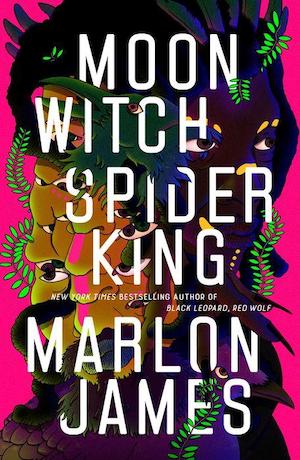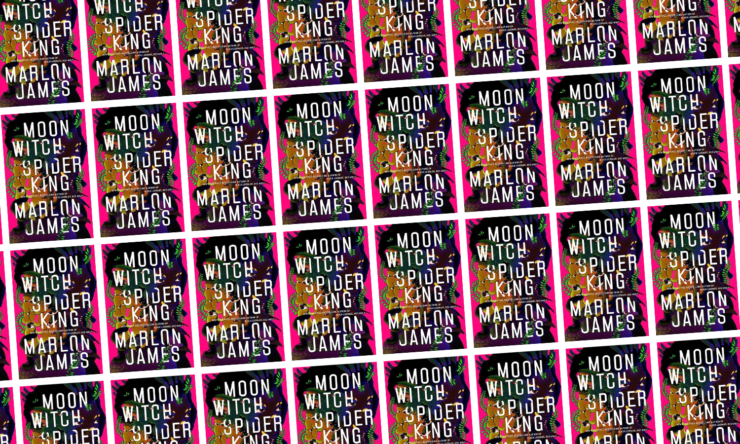It was only a third of the way into Marlon James’ latest novel that I remembered it was part of a trilogy—from my understanding, a Rashomon-style saga told in three parts from a different character’s perspective. The first was Black Leopard, Red Wolf, a fascinating tale that revolved around a highly unreliable narrator, Tracker, and an epic fantasy world filled with James’ own permutations of gods, creatures and folklore from myriad African cultures. Moon Witch, Spider King is the second installment, and while tonally different, is as consistently gripping as the first.
Moon Witch, Spider King spins a rich narrative web around Sogolon—the titular Moon Witch who appears in the previous book. It’s structured much more conventionally: a linear examination of young Sogolon’s miserable beginnings, miserable adolescence, and miserable awakening; Sogolon’s journey ultimately grows into a much greater existential conflict as she finds purpose in obliterating her nemesis.
The girls and women who inhabit James’ fantasy universe mostly face the same power structures and misogyny that we’re familiar with from both past and present, which has been something of a shallow fixation for critics who find his characters one-dimensional or cliched. These women are, for the most part, a bristling spectrum of mothers, whores, queens, concubines, brothel owners, and everything in between. But even before she got her own book, Sogolon was one of this world’s most fascinating characters whose painful development is a bloody, brutal example of the transformative magic of fiction.
Where Black Leopard set the stage for Tracker’s unlikely fellowship of adventurers—James joked, a long time ago, that this was his stab at doing an African-inspired Game of Thrones (admittedly, if we’re going down this road, Black Leopard is a lot more like the Fellowship of the Ring with more dynamic prose). Moon Witch is by and large a coming-of-age story filled with perplexing politics and arcane worldbuilding. As others have said before me, it’s reductive to compare James’ fantasy work in this way. He isn’t borrowing from famous parts of history, or drawing parallels, or using heaping spoonfuls of metaphor—he’s creating something non-standard and non-compliant and non-traditional on his own.
Buy the Book


Moon Witch, Spider King
We start off in familiar territory: a young girl is in a bad place, and she needs to leave. Sogolon, a nothing child from nowhere, runs away from home and is rudely inducted into various spheres of womanhood—she’s sold to a brothel, taken as a slave, and briefly, reluctantly recruited as a sort of royal confidante. For hundreds of pages, this is a bildungsroman where change doesn’t come easy, if it comes at all. Finally, in the third section of the book, we catch up with the events told in Black Leopard, Red Wolf—how Sogolon meets her descendant Nsaka ne Vampi and the river sprite Popele, how she sets herself upon a single-minded path away from her love and family.
James’ prose is equal parts hostile and magnetic and presents a sort of cognitive challenge for the passive reader–much has been made about the “gratuitous” violence in his fiction, which can be blunt and jarring for even the most seasoned horror/gore buff. Moon Witch, Spider King is no different in this regard—Sogolon’s path to adulthood (or if you prefer, witchhood) is marked by rape, murder, trauma, crude coping mechanisms, and vividly-described monsters that could truly haunt your nightmares. It’s all arguably a transformative use of violence, if you’re prepared to sit in for the long haul to see how this particular recipe of fictional alchemy pans out. But as with life, even the bleakest moments in the book are imbued with James’ subtle, wry humor that rekindles very necessary moments of fire and humanity in its suffering characters. Sogolon and the constellation of characters around her—hapless Mistress Komwono especially—have some absolutely killer one-liners that can snap you out of occasional stagnation (it’s a big book, folks) from James’ strategic use of repetition. Sogolon’s most universal quality, at least to me, is her burning hot streak of self-destruction that bends toward chaos, a powerful countering force to the stifling social conventions she’s forced to navigate.
That being said, Moon Witch, Spider King is a difficult read even beyond its unflinching depictions of physical and emotional carnage. While Sogolon seems somewhat more of a steady narrator than our friend Tracker in the previous book, a huge part of this trilogy concerns memory and lack of it. At times, even deep into the book when Sogolon has already ostensibly imprinted upon the reader, it’s deliberately hard to feel confidence in her account of events; the pages read like a shaky mirror of her own inability to trust herself, and her reliance on southern griots—the only griots who commit stories to pen and paper—to fill in the missing parts of her own mind. Whether this breeds empathy, sympathy, or frustration in the reader is largely up to you, but James, as always, does not make it easy to parse your own feelings towards his brooding protagonist.
My time spent with the Moon Witch was at once exhilarating and exhausting. It’s a hugely ambitious second installment that elevated my understanding and appreciation of its predecessor, but it’s best digested as a marathon rather than a sprint. And like its predecessor, this is a book very much about suffering in all its forms, even invoking a voluntary form of suffering in the reader. I hesitate to call myself a Marlon James masochist, but like Sogolon, I must come to terms with the fact that this is apparently what I am.
Moon Witch, Spider King is published by Riverhead Books.
Alexis Ong is a freelance culture journalist with weak ankles who mainly writes about games, tech, and pop culture. Her work has appeared in The Verge, Polygon, Kotaku, Rock Paper Shotgun, VICE, Dazed Digital, and more; soft spots include science fiction, internet archaeology, comics, boxing, and old games. You can find her at her website or on Twitter.











I got very excited for Black Leopard Red Wolf a couple of years ago. I considered myself a Marlon James fan because I’d read The Book of Night Women and A Brief History of Seven Killings and found both of them brilliant. James venturing into a SFF milieu would be right up my alley. I bought BLRW in hardback the day of its release, started reading, and hit a wall around 50 pages in. I decided I just couldn’t finish it. I went online and found a bunch of negative reviews to justify my position. Then I sold my unread copy to a used bookstore and moved on. But I kept having a nagging feeling in the back of my mind that maybe I’d given up too early. I’m not the type to struggle with difficult texts—I’ve read most of Gene Wolfe’s catalogue (I’ve read Book of the New Sun six times now) and I had no trouble with Malazan. BLRW shouldn’t have defeated me. Perhaps I just hadn’t been in the right frame of mind at the time. I wanted to give it a reassessment, especially with the sequel on the way. But I’d already gotten rid of the book. Of course, I could easily get a copy at the library, but I decided to take a gamble (or a leap of faith) and just bought Black Leopard again, confident that I’ll actually get through it this time . If it turns out that I still don’t like it, I’ll write James and tell him he owes me some money.